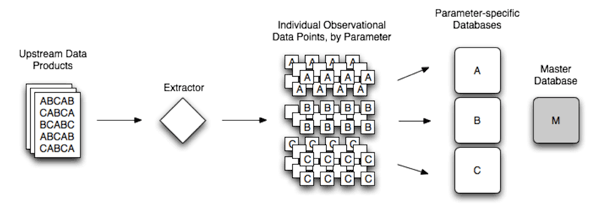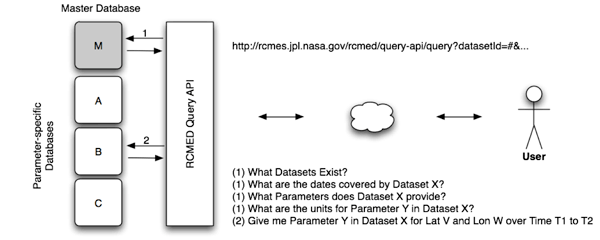The Regional Climate Model Evaluation Database (RCMED) is a scalable data store containing tens of billions of observational measurements collected over several decades by a variety of agencies including NASA, the ECMWF and others. What makes the RCMED special is the fact that all of the data is stored in a common format, making it extremely easy to request exactly the data you need to compare against a regional climate model.
The RCMED is a homogenized collection of billions (and growing) of observational climate measurements taken over several decades. The data are made available via a RESTful HTTP web interface which provides a single point of entry to the entire collection, making it easy to write scripts in any language that can make an HTTP request. The RCMED data model uses the notion that every individual observation is a DataPoint, a measurement of a particular physical Parameter (e.g. surface air temperature) that is anchored in three dimensional space and time. Data points are further linked to the Granule (file) from which they were originally extracted, and the Dataset to which the file belonged. The following diagram provides a visual picture of the RCMED data model:
The RCMED eliminates a serious roadblock to performing model-to-observational data comparisons efficiently: namely the need to first identify and acquire the necessary observational data from its various upstream sources, and then to understand its format and metadata in order to write a parser that will extract the desired data into a usable form.
The RCMED provides data based on physical parameters from a multitude of datasets. These data have been extracted from their original upstream files, sorted by parameter, tagged with the appropriate metadata, and then stored and indexed by a master database for querying. The following diagram visualizes the RCMED extraction process:

High-level overview of the RCMED extraction process
The RCMED provides a RESTful HTTP query interface that allows clients to quickly specify precisely the data they wish to obtain. Because the query interface is implemented over HTTP, clients are free to interact with RCMED using their language of choice, provided it supports HTTP requests. The diagram below depicts a selection of the use cases supported by the RCMED query interface:

High-level overview of interacting with RCMED via the query interface